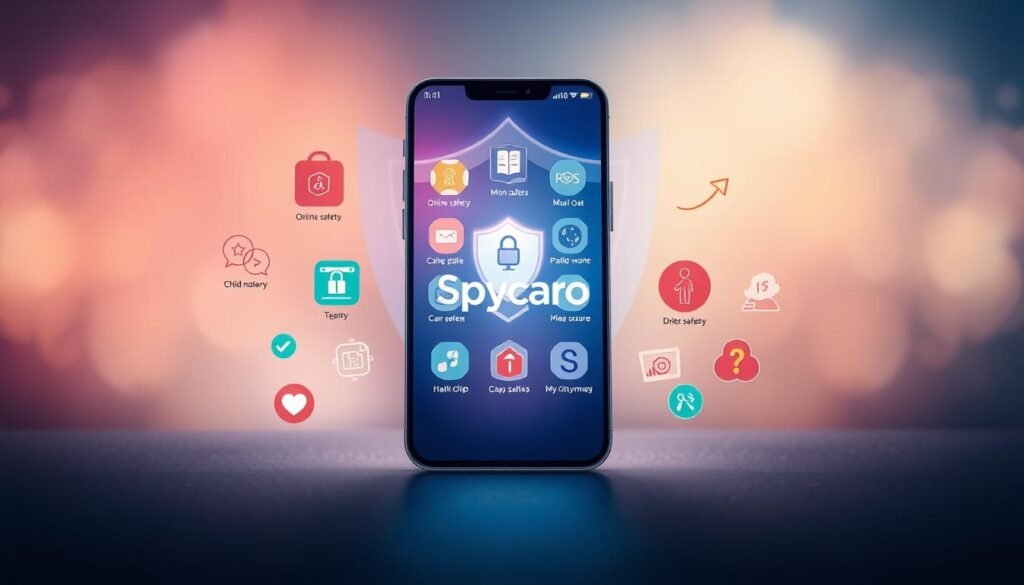In today’s world, our smartphones are like extensions of ourselves. But, a scary truth exists beneath the surface. Malicious spy apps can secretly watch and steal our personal info. With over 600 million downloads in 2023, how safe are we from these hidden threats?
Apps that look like fun games or promise easy money have fooled millions. A recent study found a stalkerware operation affecting nearly 400,000 phones worldwide. The number of victims keeps growing every day.
As we explore the dangers of mobile spyware, we must wonder: What’s hiding on our phones? And how can we shield ourselves from these sneaky apps?
What Are Spy Apps?
Spy apps, also known as surveillance software, are digital tools designed to secretly monitor and track user activity on mobile devices. They can intercept call logs, access installed applications, and even record device screens without the user’s knowledge or consent. Spy apps often disguise themselves as innocuous system applications or financial services apps to gain the necessary permissions to carry out their covert surveillance.
Definition and Purpose
Spy apps are software programs created to observe and record the activities of a user’s mobile device. They track calls, text messages, browsing history, and location. These apps are marketed as parental control tools or employee monitoring solutions. However, they can also be used for stalking, domestic abuse, and criminal activities.
Common Features
- Call and SMS interception: Spy apps can record and log all incoming and outgoing calls and text messages on the target device.
- App monitoring: These apps can track the installed applications on the device, including the usage patterns and data accessed by each app.
- Screen recording: Spy apps can secretly record the device’s screen, capturing everything the user sees and does on their device.
- GPS tracking: Many spy apps can track the real-time location of the target device, allowing the user to monitor the device owner’s movements.
- Remote access: Some advanced spy apps provide the user with remote access to the target device, allowing them to control and manipulate the device from a distance.
Examples of Popular Spy Apps
Some of the most well-known spy apps on the market include mSpy, FlexiSPY, Spyzie, and Mobile Spy. These apps often target parents who want to monitor their children’s online activities or employers who seek to oversee their employees’ work-related device usage. However, the potential for misuse and the legal implications of using such software make them a subject of ongoing controversy and debate.
How Spy Apps Work
Spy apps, like LianSpy, sneak into our devices through fake channels. They might look like updates, email attachments, or harmless apps. Once inside, they use special access to get to our private stuff.
Installation Process
The way spy apps get installed is sneaky. They might find weak spots or trick us into giving them too much power. This sneaky move helps them hide and stay on our devices.
Data Collection Techniques
- Intercepting call logs and text messages
- Monitoring installed applications and browsing history
- Recording screen activity and capturing keystrokes
- Accessing device location data and sensors
Spy apps collect lots of our digital life info. They grab things like passwords, bank details, and private chats.
Communication Methods
The data they collect goes to servers controlled by the spyware makers. This data is often hidden to keep it secret. It’s hard for us to find out and stop it.
Spy apps are a big worry for our privacy and safety. Knowing how they work helps us protect ourselves from these threats.
Legal Implications of Using Spy Apps
Mobile monitoring and surveillance software, known as “spy apps,” have big legal issues. In the United States, laws about these technologies are complex. They vary at the federal and state levels.
Privacy Laws in the United States
The Stored Communications Act (SCA) is part of the Electronic Communications Privacy Act (ECPA). It protects emails and text messages. It’s illegal to access someone’s communications without permission or to intercept them without consent, as the SCA states.
State laws on spyware differ. Some states have specific spyware laws, while others cover it under general computer crime laws. The Wiretap Act, part of the ECPA, also makes intercepting communications without consent illegal. This can lead to fines and jail time.
Consequences of Illegal Use
Breaking the Electronic Communications Privacy Act can mean up to five years in jail and fines of up to $250,000 per offense. Surveillance without consent is illegal under federal and state laws. This can lead to both civil and criminal penalties.
Age of Consent Considerations
Parents can legally monitor their minor kids, including using spy apps for safety. But, consent is crucial. It needs to be informed, documented, and updated regularly. Monitoring people without legal right is illegal and can lead to criminal or civil action.
Potential Risks of Spyware
The idea of Data Tracking and Stealth Applications might seem interesting. But, the dangers of spyware are real and serious. These programs can harm the security and privacy of users who don’t know they’re at risk.
Security Vulnerabilities
Spyware can sneak into devices in many ways. It might come through app install packages, bad websites, or file attachments. Once inside, it can use weak spots in the system to get access without permission. This can make the whole device less secure.
Personal Data Exposure
Spyware can grab sensitive info like login details, financial data, and private messages. This Data Tracking can lead to identity theft, financial loss, and broken trust. It’s a big concern for anyone’s privacy.
Device Performance Issues
Having spyware can slow down a device, make it hot, and cause crashes. These problems can mess up your online time and even stop important security tools from working. This leaves the device open to more threats.
To avoid these risks, stay alert and take steps to protect yourself. Keep your software current, use good antivirus and antimalware, and think twice before giving apps permission on your phone.
Notable Spy App Scandals
Mobile Surveillance Software and Mobile Monitoring apps have led to big scandals. In 2023, over 600 million times, malicious apps were downloaded from the Google Play store. These apps were involved in data harvesting and click fraud. Such incidents hurt users and make us question technology and our personal relationships.
High-Profile Cases
The Pegasus spyware by the NSO Group is a major scandal. It was first released in 2011 and targets apps like iMessage and WhatsApp. Lawsuits claim it was used for human rights violations.
Consequences for Users
- Pegasus can sneak onto devices without users knowing, using iOS and Android flaws.
- In September 2024, Apple stopped fighting the NSO Group in court. This shows the legal hurdles against such spyware.
- People affected by Pegasus say it ruined their privacy and trust in others.
Impact on Trust and Relationships
The Pinduoduo app scandal in China shows how Surveillance Software can damage trust. Pinduoduo, a huge e-commerce site, had malware that accessed users’ data without permission. This has hurt the app’s reputation and damaged user trust.
Signs You Might Have Spyware
In today’s world, our phones are like an extra part of us. They hold our personal info and connect us to our daily lives. But, spyware can sneak in and steal our privacy. Look out for these signs if you think your phone might have spyware.
Unusual App Behavior
Spyware can look like real apps, like “System Update” or “Device Manager.” If you see apps you don’t know, or if your phone acts slow, it might be spyware.
Increased Data Usage
Spyware apps can send your data without you knowing, using up a lot of data. Watch your data use each month. If it goes up a lot without reason, it could be spyware.
Device Performance Decline
Spyware can make your phone slow, take longer to turn off, and even get too hot. If your phone used to be fast but now it’s slow, it might have spyware.
It’s important to watch for spyware signs to keep your phone safe. By being careful and taking steps to protect yourself, you can keep your digital life secure.
Best Practices for Protecting Against Spy Apps
In today’s world, mobile Spy Apps are a big worry. These hidden programs can watch your device without you knowing. But, you can keep your phone safe and your info private by following some simple steps.
Regular Software Updates
It’s important to keep your phone’s software and apps up to date. Updates often fix security holes that bad guys use. By always updating, you can block Spy Apps and other bad stuff.
Security Software Recommendations
Get a good anti-spyware or anti-malware app for your phone. These tools find and remove any bad apps that spy on you. They help keep your device safe.
Recognizing Suspicious Downloads
Be careful when downloading new apps or files. Avoid apps from unknown places, as they might be bad. Always check what permissions an app needs, read user reviews, and look at the developer’s info before you install it.
By following these tips, you can lower the risk of Spy Apps and keep your online life private. Stay alert and keep your device secure to fight off these hidden threats.
Alternatives to Spy Apps
The digital world is always changing, and spy apps have raised big privacy and trust issues. But, there are better ways to keep an eye on things that respect everyone’s privacy and rights. These methods are more honest and fair.
Open Communication Strategies
Trust starts with open and honest talks in personal relationships. Instead of sneaking around, people should talk openly about what they need and want. This way, everyone’s feelings and privacy are respected.
Parental Control Solutions
Parents want to keep their kids safe online, but they also value their privacy. Tools like Google Family Link, Qustodio, and Bark help manage screen time and keep kids safe. They do this without sharing their personal info.
Monitoring Software with Ethical Use
At work, bosses can use software that watches productivity without spying on employees. Programs like Hubstaff, Time Doctor, and Teramind track work but respect privacy. This way, everyone’s rights are kept safe.
Looking into these alternatives helps us use technology wisely. It’s about finding ways to meet needs without losing trust and privacy. This is key for good relationships and work places.
The Role of Technology in Surveillance
In today’s world, surveillance tools have changed a lot. They offer benefits but also raise privacy concerns. Mobile apps and advanced software are key to this issue.
Evolution of Surveillance Tools
Surveillance tech has changed a lot lately. Mobile apps now collect more data and can access devices remotely. Surveillance software also got better, with features like facial recognition and GPS tracking.
The Balance Between Safety and Privacy
- Governments and groups use these tools to keep us safe and watch for threats.
- But, these tools also make us worry about our privacy and freedom, especially for parents and employers.
- Finding a balance between safety and privacy is a big challenge.
Future Trends in Spyware Usage
Experts think surveillance tools will get even better. They might use artificial intelligence to collect and analyze data better. It’s also important to protect our privacy and stop misuse of these tools.
Public Perception of Spy Apps
The way people view Mobile Monitoring and Surveillance Software apps, or “spy apps,” changes a lot. It depends on cultural norms, personal experiences, and how views change over time. It’s important to understand these changes to deal with digital privacy and security issues.
Case Studies in Public Opinion
Recent studies show different views on spy apps. For example, Nextdoor and Citizen have grown a lot, but they raise concerns about racial profiling and harassment. The Ring Neighbors app has also faced scrutiny for its work with law enforcement, with thousands of requests for footage each year.
Shifting Attitudes Over Time
Views on Mobile Monitoring and Surveillance Software have changed too. In the early 2000s, news about global surveillance programs worried many. Now, people are trying to find a balance between safety, security, and privacy. This has led to a changing view on these technologies.
Cultural Differences in Acceptance
How much people accept spy apps and surveillance varies by culture. Some communities are okay with monitoring, while others value privacy more. These cultural differences affect how people see these technologies and the laws that control them.
Conclusion: Navigating the World of Spy Apps
As we wrap up our look at spy apps, it’s clear privacy and security are big issues. The stats we’ve seen show spyware is everywhere, posing risks to people and businesses.
Recap of Key Points
Many spyware apps don’t use encryption, making it easy for hackers to get user data. Some spyware stays on devices even after they’re deleted or licenses expire. This shows how sneaky and hard to remove these tools can be.
Encouraging Responsible Technology Use
Users, developers, and lawmakers need to team up to use tech responsibly. We need better app rules and stronger mobile security. Also, keeping up with research, like at New York University, is key to fighting spyware.
Final Thoughts on Privacy and Security
The digital world is getting more connected, making privacy and security a constant challenge. This study reminds us the fight against spyware and privacy breaches is ongoing. By being more aware, protecting ourselves better, and using tech ethically, we can ensure a safer digital future.


